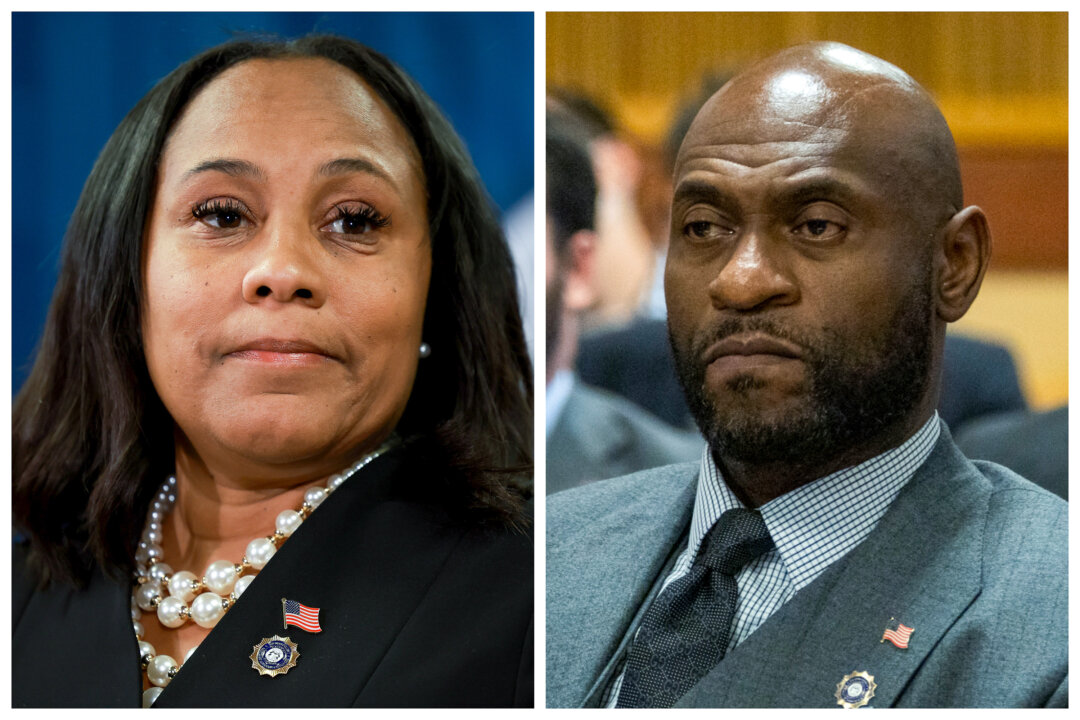A former Georgia special prosecutor who was involved in a Fulton County case against former President Donald Trump and others appeared before a House committee hearing for a deposition on Oct. 15.
Wade, in testimony submitted to the Republican-controlled House Judiciary Committee, signaled that he did not do anything wrong and did not interfere with or compromise the case, headed by District Attorney Fani Willis.
Earlier this year, Willis and Wade became embroiled in controversy. A Trump co-defendant’s attorney submitted court papers and witness testimony showing that Willis and Wade were involved in a romantic relationship. The two ultimately admitted to the relationship weeks later, although both denied allegations that the pair financially benefited from the arrangement.
In March, Fulton County Judge Scott McAfee, who wrote that an “odor of mendacity” hangs over the case, ruled that either Wade should step down from his position as special counsel in the case or Willis should remove herself. Wade later submitted his resignation, denying any wrongdoing.
According to Wade’s testimony before the panel, he said that the Trump case was “not politically motivated” and did “nothing to compromise the integrity” of the case.
“My team and I investigated the issues in the election interference case for more than two years,” he wrote. “This case was not politically motivated. Rather, it was an independent investigation based upon facts, interviews, evidence, and the rule of law. I had no mandate other than to honestly seek the truth.”
He also disputed previous claims from Republicans that officials in the White House, the White House counsel’s office, the House Jan. 6 investigative committee, or the U.S. Department of Justice were involved in the case.
When asked during a break about whether Wade would invoke the Constitution’s Fifth Amendment, which protects individuals from self-incrimination, Wade’s lawyer, former Georgia Gov. Roy Barnes, suggested that no crime was committed.
“What crime has been committed here?” he asked.
“We gave our testimony, cooperated, and we’re through,” Barnes told reporters in the Capitol as Wade stood near him in the hall.
When asked whether he believed it was an effective meeting, Barnes responded in the affirmative. When asked why, he responded, “We answered questions.”
Wade did not respond to any questions that reporters had asked him. No further details were provided, and Barnes would not answer questions about Willis or the case.
On the evening of Oct. 14, the House Judiciary Committee released two letters from Willis’s office that indicated that Wade was told not to answer any questions about the Trump case.
In a letter directed to Wade in her official capacity, Willis warned him that he had confidentiality obligations in connection to the Trump case.
“It is incumbent upon you, and your counsel, to guard against the unauthorized disclosure of confidential information by invoking all applicable legal protections and privileges” during the House deposition, Willis wrote to Wade.
Willis, in a letter to Rep. Jim Jordan (R-Ohio), the Judiciary Committee’s Chairman, wrote that Wade’s deposition may “interfere with ongoing proceedings” in the case, further suggesting that the panel should call off Wade’s testimony in the matter.
The Judiciary Committee has said it wanted to speak with Wade for months regarding the Willis case and the allegations about the Willis–Wade relationship. In multiple interviews with media outlets, including ABC News in May, Wade has said he believes their relationship was not inappropriate and described “workplace romances” as a normal occurrence.
Willis’s office has accused the former president and more than a dozen other individuals of trying to overturn the 2020 election results in Georgia as well as racketeering.
Trump and most of the co-defendants in the case have pleaded not guilty, although several people who were initially charged came to a plea agreement with prosecutors, pleading guilty in exchange for lighter penalties. The former president, who faces separate charges in other jurisdictions, has said the cases are politically motivated attempts to sway the 2024 presidential election.
After McAfee’s ruling earlier this year, Trump and several co-defendants appealed his decision to the Georgia Court of Appeals, saying that Willis should still be removed from the case. The court agreed to take up the appeal and wrote that it would not hear arguments in the Willis disqualification matter until after the election.
A court filing submitted by Willis’s office over the summer attempted to have the appeals court dismiss the disqualification bid because there was not enough evidence.
“The trial court’s careful and extensive evaluation of the resulting record, and its utter dismissal of the central evidence proffered by the Appellants, forecloses any possibility of reversal,” her office wrote in June.
The Fulton County district attorney’s office and Wade’s attorneys did not respond to requests for comment by press time.

